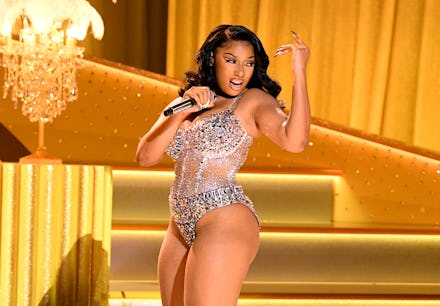The Grammys should be like this every year

Some disclaimers: The Grammys are often the least watchable of the major award shows. You have the long, meandering runtime; the nonsensical performance pairings; the minimal awards on the broadcast, which often result in uproar or apology. While the pandemic Grammys promised to be a strange, unpredictable departure in many ways — while still offering many of their central pitfalls — they somehow wound up being the best Grammy Awards in well over a decade, and possibly ever? I don’t get it either.
So aside from Billie Eilish sheepishly accepting Record of the Year by the end of the night and apologizing to Megan Thee Stallion on stage, what went right? What should they bring back for next year? Why was this the rare pandemic award show to feel right? Let’s dig into how the Grammys pulled off a stunningly good-for-the-Grammys broadcast, and what improvements are worth hanging onto:
Intimate, made-for-TV performances
New Grammy producer Ben Winston, who started The Late Late Show with James Corden, deliberately took a page from his favorite British performance shows like Jools Holland and TFI Friday. This allowed for some true in-studio alchemy, dropping a few nominees in the same big room to perform and react for one another. Right from the jump, the Grammys went 3-for-3 in winning performances with Harry Styles, Billie Eilish, and the Haim sisters — who were especially made for this format — giving it their all. The night bred some priceless reaction shots out of this, from Post Malone gawking at Cardi and Megan to Bad Bunny vibing to Dua Lipa. The sets were brilliant and high-budget as ever, but they seemed infinitely more tailored to playing well with a TV audience than anyone watching from the set. Maybe that’s how it always should be.
Let the nominees just do their thing — without the bizarre pairings
Along with the fresh, intimate studio setup, the Grammys were more content than ever to just let the nominees keep the spotlight to themselves. The awards have long chased Grammy Moments™ — that’s to say, incomprehensible pairings of artist and subject or artist and artist. Luckily, there was nothing quite like Kendrick Lamar and Imagine Dragons or the Foo Fighters EDM showcase to be had here. It seemed like every artist who wanted the opportunity — assuming Beyoncé gave them a polite no — took the stage on their own, performing either a medley of recent hits or just one nominated track. This took the runtime out past 11:30 p.m. eastern, but it didn’t feel overly padded.
The In Memoriam segment offered earnest tributes and didn’t feel bad
Award show in memoriam segments are almost guaranteed to ruffle feathers, either through omissions or who is de-emphasized. Perhaps brilliantly, the Grammys made clear to note at the top of this one that the broadcast featured an incomplete list, with a mammoth roundup of lost talents in the music world available to read over on their website. And instead of just one somber cover over the entire segment, there were fleshed-out pairings that felt suitably reverent or sentimental in their connection. Bruno Mars singing Little Richard — who else could do it? — Brandi Carlile honoring collaborator John Prine, and Lionel Richie pouring one out for his old friend Kenny Rogers. Brittany Howard also sang “You’ll Never Walk Alone” with Chris Martin on keys... which she would reprise in a whiskey commercial soon after. Little dose of vintage Grammy weirdness, but tasteful all around.
Trim down the monologue and gimmick bits
My most haunting Grammy memory in recent years involves James Corden doing Carpool Karaoke around the Staples Center, picking up loose famous audience members to hop in a tiny cardboard car. Despite his Late Late Show producer Winston taking the Grammy helm, the show seemed to move in the other direction here. Trevor Noah — by my estimate, one of the least funny late-night hosts in the business, with stiff competition — was skilled enough at keeping things moving, without a traditional monologue or too many interstitial bits. There were those clunkers on the big bed with Cardi B, and a few too many groan-worthy quips about the virus, but I’ll take it.
Let the kids play
The aforementioned Grammy Moments™ often bundle some remarkably old artist with their younger spiritual successor — or some completely off-the-map choice with no discernible connection to their legacy. Instead, we got some truly inspired performances from music’s brightest young stars. Saved for the show’s back half, Lil Baby brought “The Bigger Picture” to life with uncompromising flair, not ducking away from the grim reality of racist police violence or the Biden administration’s responsibility to move the needle. Megan Thee Stallion and Cardi B brought Ben Shapiro’s worst nightmares to life, with that massive high-heel set design and rapturously horny choreography — even if it was the most cleaned-up lyrical take (“wet, wet, wet”) to date. Even if the winners and nominations were risk-averse, the performances were allowed to swing big.